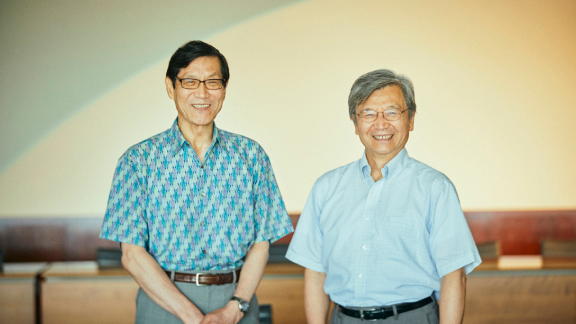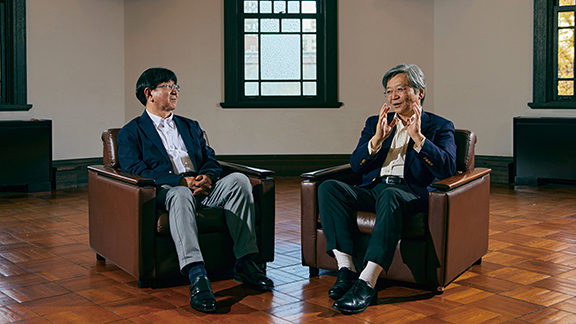Dialogue series Vol.3
Updating the humanities and social sciences with the power of information mathematics!
The new Faculty of Informatics and Mathematics is not so much responding to "what society wants" as "changing society" and "changing the world".
What are your views on the new Faculty of Information and Mathematical Sciences?
We are a late starter as an information faculty, but the advantage of being a late starter is that we can develop our strategy while keeping an eye on the trends of those ahead of us. As all information faculties are doing edgy things, doing the same thing will only lead to second-guessing. However, the University has a vast archive of research in the humanities and social sciences. I believe that how we make use of that archive will be an important key to our strategy. It also has something in common with how we use big data at the root: how we put the wisdom of the humanities and the knowledge of the social sciences, which we have earned with our feet, on the information chopping block is important. Since universities with humanities faculties are incorporating the sciences, I believe that we can use the power of the sciences to update the humanities.
I agree. I think such a strategic concept is significant not only in the context of Meiji Gakuin but also in the context of the world. What I expect from the Faculty of Information and Mathematical Sciences is cooperation with Asia. Due to its historical background, Asia tends to be regarded as the third pole after Europe and the US in the academic world. Although there are researchers in Asia who have the ability to publish papers in top journals, they are isolated from each other due to networking problems between researchers. If we could provide a transport hub to connect these researchers, an oasis for caravan groups, for example, I think we could have a very big impact. Apart from China, which has an abundance of funding and human resources, it is quite possible to collaborate with researchers from South Korea, Taiwan, Singapore and other countries, and I expect that the potential is high.
Since the Centre for the Interdisciplinary Area of Information Science will be established at the same time as the Faculty of Information and Mathematical Sciences, the strategy should be to collaborate with other faculties within the university and to function as a key centre for the Asian strategy outside the university. I think it is important to be pompous in a good way, so that the new faculty does not become an island apart from the rest of the university, and so that it can fulfil its potential in Asia.
It means a hub that connects Meiji Gakuin to the rest of the campus and to the world at the same time, but we compared it to an oasis because we believe that it is critically important for people to meet each other. When people from different places come together and interact with each other, we can expect the possibility of new things that have never been created before. It does not necessarily have to be interdisciplinary research. I think the most important thing about Oasis is that there is a place where people from different fields can comment, see the exchange and participate in it.
I think it is very important. I don't think it has to be related to information. I feel that it is really important for people doing art, people doing mathematics, people doing philosophy - all kinds of researchers and students to get together, have a coffee break and have a frank discussion about what they are doing. ... I believe that hints that could lead to new research themes in information science may lie dormant in such places.
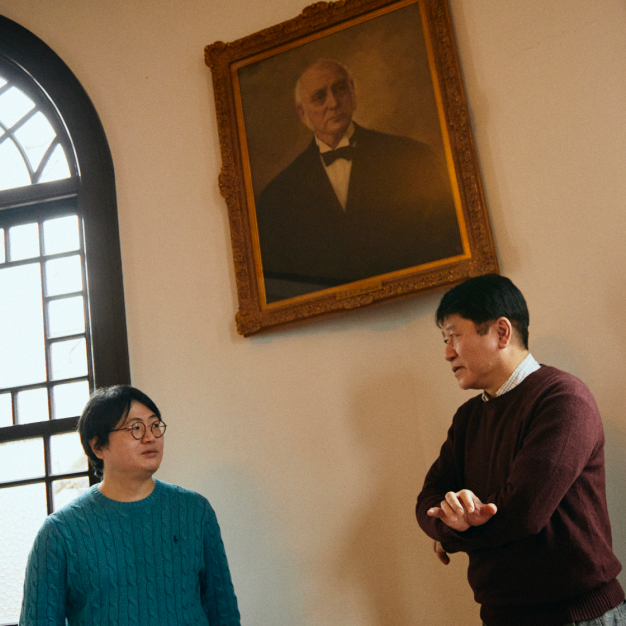
Is there anything close to the term 'fusion' of the humanities and sciences?
It's not about "merging", it's about connecting. It's about connecting with other people while maintaining our independence, but without being stuck in a 'takotsubo'.
Just like cooking, if you mix them, you get an unfamiliar taste, don't you? It's not so much about 'mixing' the humanities and sciences as it is about connecting them. I hope that we can connect in such a way that the humanities can also be nurtured in the true sense of the word through the involvement of information. The reality is that this kind of connecting technology has not yet been created in the world. Due to the currents of the past, researchers in the West are inevitably compelled to do mainstream research, but I think it is an advantage of being in Asia to be able to think from a perspective slightly removed from that.
The logic of mathematics is made into a thing of 'rustproof knowledge'.
What do you expect from an informatics and mathematics education?
In the Faculty of Economics, where I belong, it is important to study the vertical of economics, but in the case of Information and Mathematical Sciences, the focus is on information, which is evolving at an ever-increasing pace. You can study quantum computers, for example, because we bring together researchers who are doing cutting-edge research in their respective fields. However, we want students to acquire knowledge that is not immediately rusty. In the case of physics, you can use the power of mathematics to explain reality in a way that seems unreasonable, but in the case of studies that deal with humans, even if you try to use the power of mathematics, you can only make useless models. We social science researchers may lack the power of mathematics, but we also need to update our research by using the power of information on our part. I have great expectations for the emergence of students who can commit themselves to social science with the power of information.
I heard that the Faculty of Information and Mathematical Sciences cultivates not only information but also mathematical skills, and I think there should be a system to avoid becoming a mathematical geek who can only do mathematics, or a mathematical wannabe who has no interest in society at all. The issues of information and ethics are also involved in this. If you only use your information and mathematical skills to meet the demands of society, you will end up being a mere service personnel. I expect them to understand what potential information has for society and learn how to transmit it in a way that changes the social side of society. I believe that this will lead to the improvement of Japanese society and also to the world.
The future can hardly be predicted. However, the methods of experimentation, thinking logically and mathematically are fundamental, and if you learn them, you can use them in any era.
Yes, the power based on mathematics and logic will never be rusted.
However, students in the humanities are inevitably not good at mathematics, so I hope that I can invite these people into the world of mathematics through information. Students at our university don't know the lifestyle of science students who are immersed in laboratories. If the Faculty of Information and Mathematical Sciences is established, it will interact with such students, and I am sure that they will be influenced by it, and I have a feeling that interaction will arise from such exchanges.
Right. I would like the Faculty of Information and Mathematical Sciences to encourage students and researchers in the humanities to enrich their learning and research.
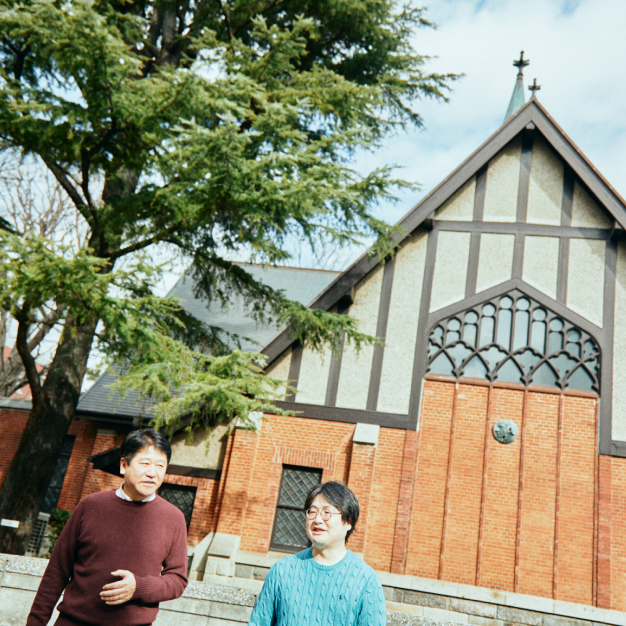
What are your views on the future of information mathematics?
The potential of technology, computation and AI is tremendous, but the reality is that the models for applying them are themselves outdated. Computational power has improved dramatically, so there are more things that can be done and there are more tools, but there are parts of the tools that are not mathematically understood. I think those parts should be well researched.
When we work together on large grants (competitive funding), people in the information sector are technologically advanced, but they tend to be 'fluffy' when they try to approach people and society. I think this fluffy feeling is probably due to the fact that our sense of what is important and what is not important has not yet been sufficiently refined. If you try to apply advanced information technology based on your own naive understanding of society and people, the result can be boring for researchers in the humanities and social sciences. Researchers in the humanities and social sciences must also come up with a counterproposal, rather than ending up with 'boring'. I expect that the establishment of the Faculty of Information and Mathematical Sciences and the Centre for the Interdisciplinary Area of Information Science will contribute to this aspect as an oasis.
List of articles in dialogue
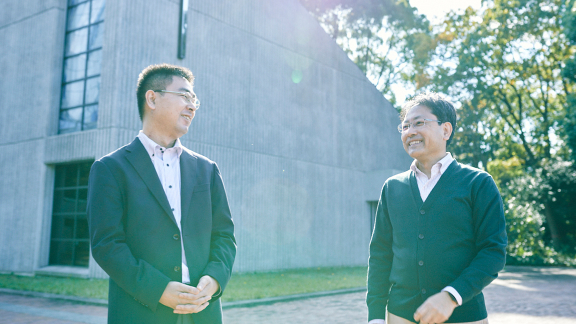 Mr. Irie (Denso) ・ Prof. Ota ed.
Mr. Irie (Denso) ・ Prof. Ota ed. Dialogue Series Vol.2 A future is coming that not even Einstein could have imagined. ― The world of "information" changed by quantum mechanics. From there, the Faculty of Information and Mathematical Sciences learns from a future perspective.
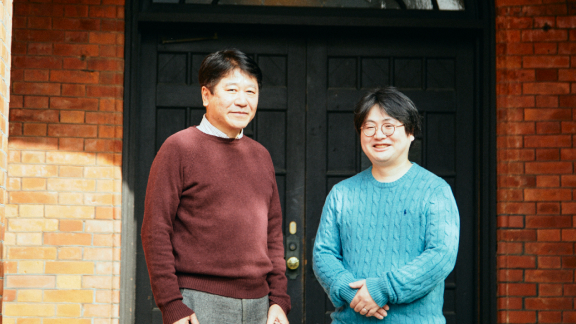 Prof. Kameda and Associate Prof. Inukai, eds.
Prof. Kameda and Associate Prof. Inukai, eds. Dialogue Series Vol.3 Updating the humanities and social sciences with the power of information mathematics! ― Information mathematics is a communication and hub that connects disciplines and people.
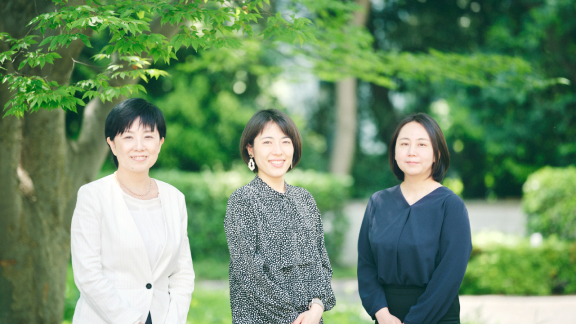 Female Researchers Edition
Female Researchers Edition Dialogue Series Vol.4 A background in informatics and mathematics is the foundation of all science. ― Great Expectations for Integration with Diverse Fields


